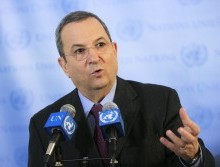With the situation in Syria turning more and more volatile and violent, Israeli Defense Minister Ehud Barak expressed anxiety on Thursday over the status of Syria’s chemical weapons. Of particular concern is that the weapons of mass destruction could end up in the hands of terrorists such as Hezbollah. His comments come as the Syrian conflict between the Bashar al-Assad regime and the opposition continues to escalate.
Speaking on a tour near the Syrian border with Israel, Barak was quoted by a press release as saying Israel is monitoring “the possibility that during the fall of the Assad’s regime, Hezbollah will try to smuggle—from Syria to Lebanon—advanced weapons systems, or heavy ground-to-ground missiles, or even chemical weapons; thus we will remain vigilant.”
Assad’s hold on power is beginning to appear tenuous, even as thousands of civilians have now been killed by his forces in the last 17 months. CNN, citing state television, reported that an explosion on Wednesday killed the country’s defense minister and other officials. Furthermore, Al Jazeera reported extensive fighting in the capital of Damascus.
Barak, in his comments on Thursday, said, “The Assad regime is getting to the point whereby it will fall and no one knows what will happen next.” He noted that among the many “actors” in Syria include terrorists from Al Qaeda.
“We obviously are not the only player in the region that is anxious; anxious about the fact that an anarchic situation will bring about the transfer of sensitive systems into the wrong hands,” said Barak. “There is no small amount of chemical weapons dispersed all around the country and there is a lot of weaponry in the hands of the civilians.”
UN Vote Vetoed Again
The Israeli Defense Minister’s comments came just hours before another attempt at the United Nations Security Council to toughen the international stance on Syria was foiled by Russia and China. For the third time, the two world powers used their veto ability on a Council resolution on Syria that would have otherwise passed.
According to the United Nations website, 11 of the 15 Council members voted for the resolution, which would have demanded the government cease the use of heavy weapons against civilian areas and pull back troops from population centers, while threatening UN sanctions for non-compliance. Pakistan and South Africa abstained in the vote.
Prior to the UN ballot, Barak critiqued the world for not doing enough to address the Syrian crisis and warned that things will only get worse if the violence continues.
“We also estimate that the longer the civil war lasts, the greater the resentment, the greater the will for vengeance, and the greater the anger between the sides,” said Barak. “Assad’s fall could therefore lead to a continuous civil war and chaos.
“In this situation we could also find ourselves with the Golan Heights serving as a new platform from which terrorists could launch attacks against Israel. Therefore we need to have a quiet presence in this area, and be both alert and ready [for each and every scenario].”
(By Joshua Spurlock, www.themideastupdate.com, July 19, 2012)

